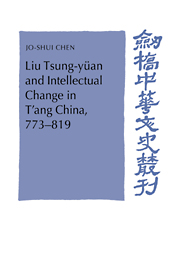Book contents
- Frontmatter
- Contents
- Acknowledgments
- Maps
- Chronology
- Abbreviations
- Introduction
- 1 Literati and thought in the early and middle T'ang
- 2 Liu Tsung-yüan and the circumstances of Ch'ang-an
- 3 805: The abortive reform
- 4 Declaration of principles: Tao and antiquity
- 5 Heaven, the supernatural, and Tao
- 6 Literary theory, canonical studies, and beyond
- 7 Sources of Liu's Confucian thought
- 8 The private sphere
- Conclusion
- Glossary
- Bibliography
- Index
5 - Heaven, the supernatural, and Tao
Published online by Cambridge University Press: 07 October 2009
- Frontmatter
- Contents
- Acknowledgments
- Maps
- Chronology
- Abbreviations
- Introduction
- 1 Literati and thought in the early and middle T'ang
- 2 Liu Tsung-yüan and the circumstances of Ch'ang-an
- 3 805: The abortive reform
- 4 Declaration of principles: Tao and antiquity
- 5 Heaven, the supernatural, and Tao
- 6 Literary theory, canonical studies, and beyond
- 7 Sources of Liu's Confucian thought
- 8 The private sphere
- Conclusion
- Glossary
- Bibliography
- Index
Summary
Throughout his writings, Liu Tsung-yüan took pains to make the point that the human world was a self-sufficient realm, and did not have any connection with phenomena outside or beyond its domain. All the moral principles that he upheld and deemed part of the Tao were secular both in their origins and in their effects. These principles were neither derived from superhuman, transcendental imperatives, nor would their application result in practical happiness as a reward from a higher being or through the workings of an invisible supreme law. Likewise, the failure to follow the Confucian Tao would not necessarily lead to disaster. Liu once charged that stupidity and deception were what produced talk about the correlations between this world and the otherworld. As stated in Chapter 4, these were Liu's most distinctive as well as most fully elaborated ideas. It is my hope that a detailed examination of them will bring more light to the nature of and nuances within his Confucian ideas. Following this discussion, I shall compare Liu's notion of the Confucian Tao with those of other leading Confucian intellectuals in his time, so that the historical significance of his thought can be illuminated.
On “superstitions”
Liu fired his criticism at virtually all major types of conceptions pertaining to higher entities in his time: popular supernatural beliefs, the Taoist quest for longevity and immortality, and the Confucian idea of Heaven.
- Type
- Chapter
- Information
- Publisher: Cambridge University PressPrint publication year: 1992



